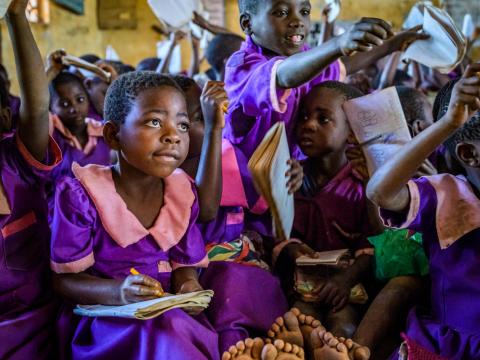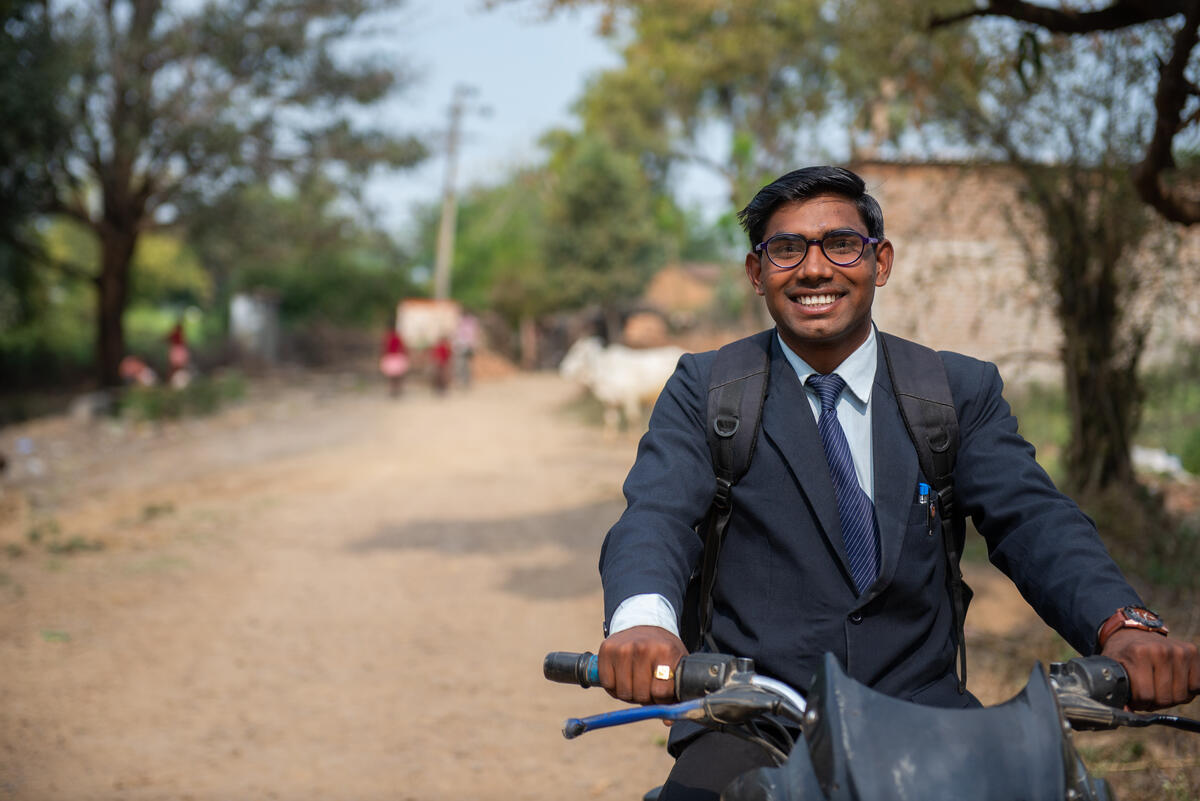When the end is a beginning: 5 reasons why the end of your sponsored child’s project is good news

It’s natural to feel a sense of sadness or loss when a meaningful relationship ends – and that’s exactly what many long-term sponsors experience when their sponsored child and their community are ready to continue making progress on their own. But could the end really be the beginning?
It might sound like a strange way to begin a relationship – but even before we start work in a community, our sights are set on leaving. That’s because the ultimate goal of child sponsorship is to empower children, their families and their community to break free from poverty, for good.
It takes time – usually 10 to 15 years – to equip communities to lead and achieve long-term change, tackling the root causes of poverty that hold their children back. But there comes a point where the communities we partner with decide they’re ready to continue making progress on their own. They have the knowledge, skills and resources to stand on their own two feet, and continue improving their children’s lives without us.
It’s an amazing moment! It’s what we’ve been working towards together. But for many sponsors it can be bittersweet. Because when a community is ready to face the future on their own, it also means it’s time to say goodbye to your sponsored child. And goodbyes can be hard.
While it might seem like the end, it’s actually the beginning of a brilliant new chapter for the community and for each child in it. If you’re saying goodbye to your sponsored child right now, or will be soon, here are five things to remember.
1) You’ve helped transform the life of your sponsored child and their community, for good
Because of you and other sponsors who supported children in the same community, life today looks very different to how it did a decade ago. Whether children needed clean water to stop disease, nourishing food to eradicate malnutrition, better healthcare to prevent child deaths, education for a self-reliant future, child protection to end abuse, or stable family incomes to lift them above poverty for the long term – you’ve helped a community struggling to survive become a place where children can thrive.
2) Your sponsored child’s life is better because you cared
Sponsorship changes everything for a child, from the inside out. Your legacy in your sponsored child’s life is much more than practical support – as necessary and powerful as that is. It’s also their personal development, confidence, self-worth and the hope and encouragement that comes from knowing that someone in another part of the world believed in them and their future.

Shishupal, once a sponsored child, is now the principal of a local school in his community in India, where he is working to help the next generation of children learn how to build a life free from poverty.
Research shows that children who participate in our sponsorship activities are happier, healthier and more hopeful, and better educated and equipped for the future. Shishupal, now 24, is living proof. Today, he is a school principal helping children unlock their own potential. Sponsored for 10 years, Shishupal was once so shy he couldn’t say his name in public. But because of the care and support of a sponsor like you, he became a leader in his community and is a passionate advocate for children.
“I thought I wouldn’t be able to do anything in life. I didn’t want to attend school because I was very shy. So much changed because of World Vision. Now teaching is my passion, but serving our society is the most important thing I learned from World Vision,” Shishupal says.
3) You’ve empowered your sponsored child and their community to keep making the changes they want to see
You haven’t just made life better for your sponsored child in the moment, you’ve equipped children and community members to lead their own change, and to continue building the community they want to live in long after your sponsorship ends.
Yobe Jolom Mpanang’ombe, a senior chief in Nthondo, Malawi, explains how sponsorship, which ended in his community in 2019, changed not just his community’s physical situation, but their way of thinking too.
“External support had been flowing into this area for years, but for most people, little had changed. They were still doing subsistence farming, struggling with poverty and looking to NGOs [non-government organisations] or the government for support.
“World Vision’s training is different. It made us think about what we want to do to develop. It provoked our thinking and changed our mindsets.
“Lots of people here used to cultivate tobacco, but they didn’t earn much. The costs of production are high and the profit is minimal, but we continued to grow it anyway because it’s what we knew. But, when I came home from the training, I removed my 10 acres of tobacco and replanted with groundnuts, soya, maize and tomatoes. It feels good… so many people are now preparing to harvest greater yields.
“World Vision opened our minds so we can make the right decisions. Instead of giving us fish, it has taught us how to fish.”
4) You’ve equipped local leaders to face future challenges
Because the focus from the very beginning is about equipping local people to lead transformational lasting change, communities are more empowered, confident and resourced to face whatever new challenges arise. The COVID-19 pandemic has reminded us that the future is never certain – but having the right training, mindset, partnerships and preparation to cope with new challenges can make all the difference.
In Senzani, Malawi, where sponsorship recently ended, the community set up important infrastructure like deep wells to provide clean water and an HIV treatment centre where people could get testing and support. But community members say the most significant difference came from empowering local people to lead the change. And that will continue to help Senzani to tackle challenges for years to come.
“World Vision wanted us to fight the [HIV] pandemic our own way as a community,” recalls Ruth, an HIV survivor and advocate who campaigned for the construction of Senzani’s HIV treatment centre.
Frank Magetsi, a former development worker for World Vision in Senzani who helped the community tackle a cholera outbreak, says equipping the community with the hygiene facilities and knowledge they needed to beat the illness saved lives – not just in that outbreak, but in the years that followed. “We knew that hospitals needed to treat patients and prevent death. But the long-term and game-changing solution was community development – giving people long-term access to sanitation through clean water and knowledge about hygiene and sanitation.”
5) You can do it all again and help another child and community in need
When child sponsorship comes to an end in a community, it means children and their families are ready to face the future on their own. They are self-sufficient and thriving!
But there are many other children and communities around the world who still face crippling poverty. The end of one sponsorship opens the door for you to help another child who needs you, and transform another community into a place where children can grow up safe, educated and healthy.
You set out to change a life when you chose to sponsor a child. Through updates and reports, you’ve seen the lasting difference you’ve made, not just for your sponsored child, but their entire community. You’ve made change possible. Change that will last. It’s an achievement worth celebrating!
There’s no better way to acknowledge all you’ve achieved than to do it all again!